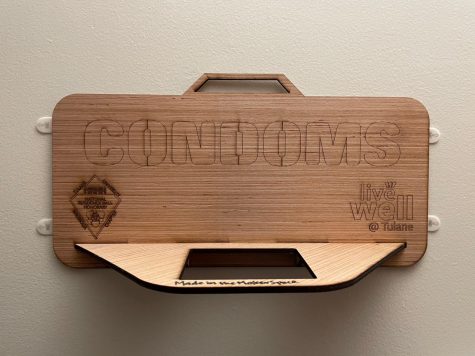Changes to safe sex resources in residence halls
February 11, 2021
Upon the return to campus in August 2020, President Mike Fitts announced changes to student life to prevent the spread of COVID-19, including frequent testing and student restrictions in residence halls. These protocols have changed the interaction of students, staff and organizations on campus both in the dorms and around campus. An unforeseen repercussion of these changes has been that Tulane students no longer have access to safe sex resources where they live on campus.
The Well for Health Promotion works on campus to provide students with the resources to make smart, healthy decisions regarding their health and personal goals. They focus on a wide variety of positive and holistic wellness areas, one of which is sexual health. In the past, this has meant distributing condoms into on-campus housing to provide students with the means to have safe, protected sex. Amidst the COVID-19 pandemic, however, their capabilities have shifted.
One of the main changes to student life this year has been the restriction of bringing guests into on-campus dorms.

“This has been done to minimize possible transmission of COVID-19. Unfortunately, it means that staff from The Well for Health Promotion and the TUPHE program are not allowed in the residence halls this year,” Alicia K. Czachowski, Director of Public Health Initiatives and Assessment, said.
In past years, the Well would frequently restock boxes around the dorms to ensure students could practice safe sex, should they realize they didn’t have their own supplies. The Tulane University Peer Health Educators would restock several times each month, as supplies would dwindle quickly. Now that the Well is no longer restocking the boxes, some students are facing choices about whether to use protection or not.
“I definitely think people would use condoms in my dorm, as there are people who have sex in every year at Tulane,” Arielle Morris, currently a sophomore living in Décou-Labat Residences, said. “Also, many students don’t have cars to go to a store and buy condoms or don’t want their Amazon order history to show ‘condoms,’ so students would be more inclined to use the condoms available in the dorms if that’s the only choice of birth control available to them.”
Genevieve Corkery, a junior Residence Advisor living in Wall, emphasized that many students likely won’t practice safe sex if they have to go out of their way to do so.
“Because this resource has been removed, some students might not get the supplies/resources they need because they are reluctant to ask,” Corkery said. “This is yet another hoop for residents to jump through, and many probably will not.”
Despite the Well advocating for positive, safe practices, these changes are creating more barriers to healthy living in dorms.
In their published guide to “Safer Sex and COVID-19 at Tulane,” the Well acknowledges the risks of having unprotected sex, aside from the risks of transmitting coronavirus.
“What we do know is that COVID-19 is especially dangerous in bodies that are fighting other infections and diseases. Keeping your body healthy by doing everything to avoid being infected with an STI or HIV can help protect you from a bad COVID-19 infection.” the Well wrote in their guide.
While safer sex supplies may not be available in common room areas this year, TUPHE’s are still working to provide free resources around campus. RA’s on campus can also supply safer sex materials, via request to their Resident Directors and to their dorms. Some other locations to find free supplies include the Lavin-Bernick Center, Reily Center bathrooms and the Student Health Center. For more details on these locations, visit https://campushealth.tulane.edu/well/sexual-health.






















Leave a Comment